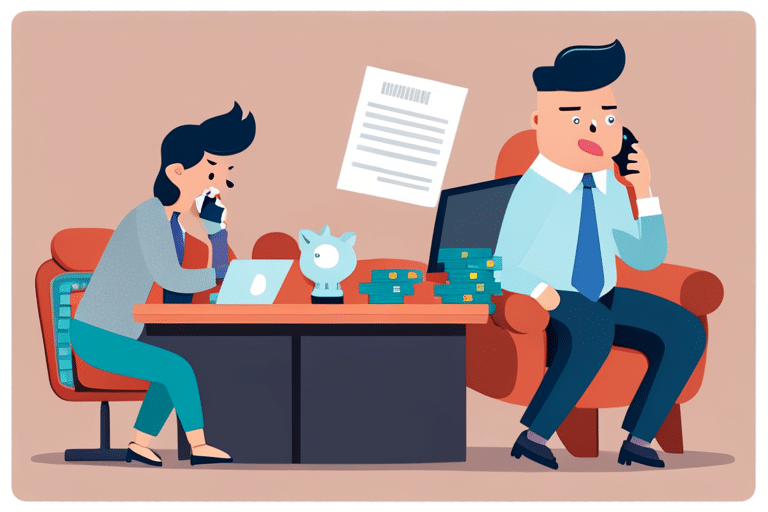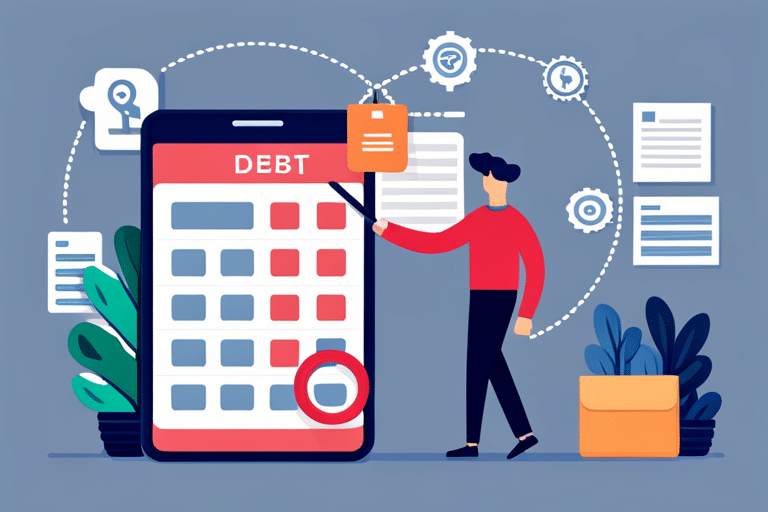Hey there! Did you know that the average American has over $38,000 in personal debt? Yikes!
But don’t fret, because we’ve got just the tips you need to negotiate with creditors and lower that burden.
In this article, we’ll guide you through understanding your debt situation, assessing your financial capability, gathering information about your creditors, and creating a realistic repayment plan.
So get ready to take control of your finances and say goodbye to those sleepless nights. Let’s dive in!
Key Takeaways
- Assess your debt to income ratio and prioritize tackling high-interest debts first.
- Gather information about your creditors and keep track of communication and agreements.
- Create a realistic repayment plan by exploring payment options and implementing debt reduction strategies.
- Use negotiation tactics such as being polite and firm, mentioning debt negotiation strategies, and emphasizing open and honest communication.
Understanding Your Debt Situation

You need to take a close look at your debt situation and understand how much you owe to each creditor. Think of it as going on a debt scavenger hunt, but without the fun and excitement.
First, assess your debt to income ratio – that’s just a fancy way of saying how much of your monthly income goes towards paying off your debts. It’s like trying to balance a tower made of Jenga blocks while riding a unicycle – tricky, but not impossible!
Next, let’s talk about interest rates. They can be like those pesky mosquitoes buzzing around your head on a summer evening – annoying and hard to get rid of! Understanding interest rates is key to getting out of debt faster. High interest rates are like weeds in your garden – they keep growing and taking over everything! So, make sure you know which creditors have the highest interest rates so you can focus on tackling those first.
Assessing Your Financial Capability

Assessing your financial capability can help determine your ability to manage and repay debts. But don’t worry, it’s not as daunting as it sounds! Think of it as a fun little game where you get to be the detective of your own finances. So grab your magnifying glass and let’s get started!
First things first, let’s assess your income. Take a look at all the money coming in each month – your salary, any side hustles, or even that birthday check from Aunt Martha (thanks, Aunt Martha!). Write down those numbers and give yourself a pat on the back for being such a money-making machine.
Next up is evaluating expenses. Get out your Sherlock Holmes hat because now it’s time to investigate where all that hard-earned cash is going. Look at your bills, receipts, and bank statements to see what you’re spending on essentials like rent, groceries, and utilities. And hey, we won’t judge if there are one too many takeout orders on there – we’ve all been there!
Now that you have assessed your income and evaluated expenses, you have a better understanding of how much money you have left over each month. This will come in handy when gathering information about your creditors because knowing what you can afford to pay will help with negotiations. So put down that magnifying glass for now and let’s move on to the next step: gathering information about those pesky creditors!
Gathering Information About Your Creditors

When gathering information about your creditors, it’s important to be thorough and organized. You don’t want to be caught off guard when you finally pick up the phone or send that email. So grab a pen, put on your detective hat, and let’s dive into the exciting world of creditor communication and debt negotiation strategies.
Here are some tips to help you gather all the necessary information:
-
Create a spreadsheet:
List down all your creditors’ names, contact information, and account numbers.
Keep track of any previous communications or agreements. -
Research their policies:
Check their websites for any specific debt negotiation guidelines they may have.
Look for any recent changes in their policies that might affect your negotiations.
Now that you’re armed with this valuable information, it’s time to start communicating with your creditors like a pro! Remember, open and honest communication is key. Be polite but firm in expressing your financial difficulties and willingness to make things right. And don’t forget to mention any relevant debt negotiation strategies you’ve come across during your research.
Creating a Realistic Repayment Plan

Hey there! So, you’ve gathered all the information about your creditors, and now it’s time to create a plan to tackle that debt.
Let’s talk about some key points like monthly payment options (because flexibility is key), debt reduction strategies (let’s get creative and kick that debt to the curb), and negotiation tactics (time to put on your negotiating hat and save some money).
Trust me, we’re going to make this repayment journey as fun as possible!
Monthly Payment Options
One option for reducing your monthly payments to creditors is to explore different payment plans. When it comes to negotiating with your creditors, monthly payment negotiation is key. So why not have a little fun while figuring out the best plan for you? Here are some creative options to consider:
-
The ‘Gradual Release’ Plan: Start with higher monthly payments that gradually decrease over time, like a rollercoaster ride of financial freedom.
-
The ‘Pick and Choose’ Plan: Negotiate separate payment amounts for each creditor based on their willingness to work with you. It’s like curating your own personal debt orchestra.
Debt Reduction Strategies
To reduce your debt, consider implementing various strategies that can help you regain financial stability. It’s time to take charge and show your debt who’s boss! We’ve got some clever tricks up our sleeves that will have you saying goodbye to those pesky bills in no time.
But before we dive into the nitty-gritty, let’s take a look at this handy-dandy table below. It highlights two popular options for tackling your debt: debt consolidation and debt management programs.
| Debt Consolidation Options | Debt Management Programs |
|---|---|
| Combines multiple debts | Creates a repayment plan |
| Lower interest rates | Negotiates with creditors |
| Simplifies monthly payments | Helps lower overall debt |
Now that we’re on the same page, let’s explore these strategies further. Debt consolidation options allow you to combine all of your debts into one manageable payment. This not only simplifies things but can also result in lower interest rates.
On the other hand, debt management programs work by negotiating with your creditors on your behalf. They create a repayment plan that suits both parties and helps lower the overall amount you owe.
Negotiation Tactics
Negotiation tactics can help you reach a favorable agreement with your creditors and potentially reduce the amount of debt you owe. So, grab your negotiation skills and let’s dive into some creative communication techniques that will have those creditors eating out of your hand!
Here are a few handy tactics to keep in mind:
- Be prepared: Do your research and gather all the necessary information before entering negotiations.
- Know your debt inside out: How much do you owe? What are the interest rates?
-
Understand your financial situation: Can you realistically afford to pay off the debt?
-
Stay calm and confident: Remember, you’re the master negotiator here!
- Keep a positive attitude (and maybe even wear your lucky socks).
- Use assertive language, but always be respectful.
Now that you’ve honed your negotiation skills, it’s time to explore debt consolidation options. Trust me, they’ll be begging to give you a better deal after these tactics!
Exploring Debt Consolidation Options

So you’re considering debt consolidation, huh? Well, let’s weigh the pros and cons first.
On the bright side, consolidating your debts can simplify your payments and potentially lower your interest rate.
However, it’s important to choose the right option that fits your financial situation like a well-tailored suit.
And don’t forget about the impact on your credit score – make sure you understand how consolidation could affect that three-digit number!
Pros and Cons
When considering negotiating with creditors to lower your debt, it’s important to weigh the pros and cons. Here are some tips and tricks to help you navigate this tricky process:
- Pros:
- You can potentially lower your overall debt amount.
-
You may be able to negotiate more favorable repayment terms.
-
Cons:
- It can negatively impact your credit score in the short term.
- There’s no guarantee that creditors will agree to negotiate.
Negotiating with creditors is like playing a game of financial chess. You need to strategize, anticipate their moves, and make calculated moves of your own. Remember, this process requires patience and persistence. Don’t be afraid to ask for help from professionals if needed.
Now that you know the pros and cons of negotiating with creditors, let’s move on to choosing the right option for you.
Choosing the Right Option
Once you have weighed the pros and cons, it’s time to figure out which option is the right one for you. Choosing the right strategy when negotiating with creditors is crucial. You want to ensure that your approach is effective and gets you the best possible outcome. To help you make an informed decision, here’s a handy table comparing different communication techniques:
| Strategy | Pros | Cons |
|---|---|---|
| Direct | Clear and straightforward | May be seen as confrontational |
| Indirect | Builds rapport | Could lead to misunderstandings |
| Assertive | Balances firmness and respect | Requires practice |
Now that you have a clearer idea of the different strategies, it’s time to choose one that suits your personality and situation. Remember, effective communication techniques can greatly impact your negotiation success. Speaking of impact, let’s talk about how these negotiations might affect your credit score in the next section.
Impact on Credit Score
So, you’ve chosen the right option for negotiating with your creditors and lowering your debt. Good job! Now, let’s talk about how this decision might impact your credit score, creditworthiness, and borrowing capacity. Buckle up, because we’re diving deep into the world of credit!
Here’s a little bullet list to guide you through this topic:
- Impact on Credit Score:
- Negotiating with creditors could initially have a negative impact on your credit score.
-
But fear not! As you start making consistent payments towards your negotiated debt, your score will gradually improve.
-
Creditworthiness and Borrowing Capacity:
- While negotiating may temporarily affect your creditworthiness, it also shows lenders that you take responsibility for managing your debts.
- Once you successfully lower your debt and improve your financial situation, future lenders may consider you as less risky and be more willing to lend to you.
Negotiating Interest Rate Reductions

If you want to lower your debt, try negotiating with your creditors for interest rate reductions. Think of it as a game of financial chess, where you strategize and make moves to outsmart the mighty credit card companies.
Start by gathering all your bills and summoning your inner negotiator. Give them a call and unleash your charm, explaining how you’re determined to pay off your debt but need some help along the way.
When negotiating, don’t be afraid to ask for more than just an interest rate reduction. Explore options like negotiating principal reduction or even refinancing. Remember, no one likes paying high interest rates, not even the creditors themselves!
Picture yourself in a room full of bankers wearing fancy suits while you walk in with confidence and charisma. Show them that you mean business! Explain why an interest rate reduction would benefit both parties and watch as they start squirming in their leather chairs.
As you wrap up negotiations on interest rates, smoothly transition into requesting late fee and penalty waivers. After all, what’s the point of lowering your interest rate if those pesky fees keep piling up? Be persistent but polite, reminding them that every dollar saved is another step towards financial freedom.
With these negotiation skills at hand, there’s no doubt you’ll become a master of debt-reduction! So go forth my friend, conquer those high-interest rates and wave goodbye to unnecessary fees!
Requesting Late Fee and Penalty Waivers

Hey there, savvy negotiator! Ready to dive into the world of fee waivers, late payment penalties, and debt reduction?
Well, buckle up because we’re about to take you on a wild ride filled with clever negotiation techniques that will have your creditors eating out of the palm of your hand.
From charmingly convincing them to waive those pesky fees to sweet-talking your way into reducing those dreaded late payment penalties, we’ve got all the tips and tricks you need to conquer your debt like a boss.
Fee Waiver Negotiation Techniques
One effective technique for negotiating a fee waiver with creditors is to highlight your financial hardship. By explaining your current financial situation and the challenges you are facing, you can appeal to the creditor’s empathy and increase your chances of success.
Here are some lighthearted and creative strategies to help you in your fee negotiation journey:
-
Show them the numbers: Provide detailed documentation of your income, expenses, and any outstanding debts.
-
Offer alternatives: Propose alternative solutions such as a payment plan or a reduced settlement amount.
-
Get creative: Suggest out-of-the-box ideas like volunteering for their organization or promoting their services on social media.
Reducing Late Payment Penalties
To minimize late payment penalties, make sure to promptly communicate with your creditors and set up a realistic payment schedule. Remember, they’re not the enemy! They want their money back just as much as you want to pay them.
So, why not have a little fun while negotiating? Picture yourself as a smooth-talking detective, ready to crack the case of reducing those hefty penalties.
Start by reaching out to your creditors and explaining your situation honestly and openly. Show them that you’re serious about resolving your debt by proposing a realistic payment plan that fits your budget.
And here’s a secret weapon: ask about any potential debt settlement opportunities or if they can lower those pesky interest rates. Who knows, you might just come out of this negotiation feeling like Sherlock Holmes himself – victorious and debt-free!
Negotiating Debt Reduction
If you’re serious about reducing your debt, start by reaching out to your creditors and proposing a realistic payment plan. Negotiating with creditors can be intimidating, but with the right tactics and effective negotiation techniques, you can lighten the burden of your debt.
Here are some tips to help you navigate the process:
- Prepare Yourself:
- Do your research on your creditor’s policies and options available.
-
Gather all necessary financial documents to support your proposal.
-
Master Your Pitch:
- Be confident in presenting your case and emphasize your commitment to fulfilling your obligations.
- Clearly explain why a reduced payment plan would benefit both parties.
Seeking Debt Settlement Opportunities

When seeking debt settlement opportunities, it’s important to carefully consider your financial situation and determine the best course of action. Debt relief is a serious matter, but there are options available to help you get back on track.
One avenue you can explore is working with debt settlement companies. These professionals act as superheroes in the financial world, negotiating with your creditors on your behalf.
However, before getting too excited about the idea of all your debts magically disappearing, there are a few things to consider. Not all debt settlement companies are equal, so it’s crucial to do your research and choose wisely.
It’s also important to understand that debt settlement isn’t easy. It takes time and effort to reach an agreement with your creditors. You’ll need to provide proof of your financial hardship and convince them that settling for less is better than receiving nothing at all.
But don’t worry! In the next section, we’ll delve into how to explain your financial hardship effectively and increase your chances of success. So stay tuned and prepare to impress those creditors with your story!
Explaining Your Financial Hardship

Don’t underestimate the power of explaining your financial hardship to your creditors. It can greatly increase your chances of reaching a favorable settlement agreement.
When it comes to communicating financial hardships, you have the opportunity to showcase your storytelling skills. So get ready to put on your best performance and win over those debt collectors with these handy tips:
-
Craft a compelling narrative: Paint a vivid picture of how you ended up in this financial pickle. Use colorful language and sprinkle in some dramatic pauses for effect.
-
Highlight unexpected twists and turns: Did a pet unicorn eat all your money? Or maybe you invested heavily in an unsuccessful avocado toast business? Whatever the reason, make it memorable.
-
Emphasize personal growth: Show that you’ve learned from past mistakes and are committed to making positive changes. Perhaps mention how you’ve started using coupons or even taken up dumpster diving as a hobby.
By effectively explaining your financial difficulties, you’ll make yourself relatable and increase the likelihood of getting that settlement agreement.
And speaking of agreements, let’s move on to the next step: negotiating lower monthly payments…
Negotiating Lower Monthly Payments

Hey there, tired of those pesky creditors constantly hounding you for payment? Well, fret no more! In this discussion, we’ll dive into some clever creditor payment negotiation techniques that will have you feeling like a debt-reducing superstar.
We’ll also explore some nifty debt reduction negotiation strategies and lower monthly payment options that will lighten your financial burden faster than you can say ‘adios, debt!’
Creditor Payment Negotiation Techniques
One effective technique for negotiating with creditors to lower your debt is by offering a lump-sum payment.
Picture this: you walk into the creditor’s office, armed with a suitcase filled with cash (or maybe just a checkbook). You confidently propose a one-time, all-encompassing payment that will satisfy your entire debt in one fell swoop. The creditor’s eyes widen and their heart skips a beat at the sight of your determination. They know they have encountered a master negotiator.
In this delicate dance of creditor communication and debt negotiation process, consider these tips:
-
Be prepared: Research your options beforehand and come up with an amount that is reasonable for both parties.
-
Create leverage: Highlight any potential consequences for the creditor if they do not accept your offer.
-
Play it cool: Maintain composure and confidence throughout the negotiation process.
With these techniques in your arsenal, you’ll be well on your way to lowering your debt in no time. So go forth, brave negotiator, and conquer those creditors!
Debt Reduction Negotiation Strategies
Alright, so you’ve learned some amazing techniques for negotiating with your creditors to lower your debt. Now it’s time to dive into some strategies that can help you achieve debt negotiation success. But before we get into that, let me present you with a handy-dandy table to make things more enjoyable and relatable:
| Negotiation Strategy | Description | Effective Communication Tips |
|---|---|---|
| Be Prepared | Gather all necessary information about your debt and financial situation. | Clearly articulate your needs and goals. |
| Offer a Reasonable Plan | Propose a realistic payment plan or settlement offer. | Use persuasive language and highlight the benefits for both parties. |
| Stay Calm and Polite | Keep emotions in check and maintain a respectful tone throughout the negotiation process. | Active listening, empathy, and maintaining professionalism are key. |
Now that you have this nifty table at your disposal, let’s delve into these strategies further! Remember, effective communication during negotiation is vital for achieving successful outcomes in reducing your debt. So stay confident, keep those communication skills sharp, and negotiate like a pro!
Lowering Monthly Payment Options
If you’re looking to reduce your monthly payments, there are several options available to help you manage your finances more effectively. Here’s a handy guide to navigate the world of monthly payment negotiation and debt repayment options:
- Payment Negotiation Strategies:
- Prioritize: Make a list of all your debts, starting from highest interest rate to lowest. Focus on negotiating with the creditors holding the highest balances first.
-
Communication is key: Reach out to your creditors and explain your financial situation honestly. They may be willing to reduce your interest rates or offer flexible payment plans.
-
Debt Repayment Options:
- Debt consolidation: Combine multiple debts into one loan with a lower interest rate. This can simplify payments and potentially save you money in the long run.
- Credit counseling: Seek advice from reputable credit counseling agencies who can provide guidance on budgeting and negotiating with creditors.
Requesting a Temporary Payment Suspension

When negotiating with creditors to lower your debt, it’s important to consider requesting a temporary payment suspension. This can give you some breathing room and allow you to regroup and come up with a plan. Plus, it’s always nice to take a break from those pesky monthly payments, right?
To help evoke an emotional response in you, dear reader, let me present a table showcasing the potential benefits of requesting a temporary payment suspension:
| Benefits | Emotional Response |
|---|---|
| Reduced stress | Ahh, relief! |
| Time to reassess finances | Let’s get organized! |
| Opportunity for financial growth | Hello, brighter future! |
Now that we’ve explored the emotional side of things, let’s dive into the mastery aspect. When negotiating for a temporary payment suspension, be prepared to discuss alternative payment arrangements or solutions. Show your creditor that you are actively working towards managing your debt responsibly.
And speaking of responsible debt management, offering a lump sum settlement is another option worth considering. It can provide significant savings and help you become debt-free faster. So let’s delve into this next step on our journey towards financial freedom!
Offering a Lump Sum Settlement

Offering a lump sum settlement can provide significant savings and help you become debt-free faster. It’s like hitting two birds with one stone, except in this case, the birds are your debts and the stone is your negotiation skills. So get ready to channel your inner negotiator and let’s dive into the world of debt settlement negotiation!
Here are some tips to help you navigate this process:
- Do Your Research:
- Understand your rights as a debtor
-
Familiarize yourself with debt settlement laws
-
Prepare for Battle:
- Gather all relevant financial information
- Determine a realistic lump sum payment amount
Now that you’re armed with knowledge, it’s time to put on your negotiation hat and make that offer! Remember, confidence is key. Treat it like a game; think of yourself as a cunning chess player outsmarting your opponent (in this case, your creditors).
Once you’ve made the offer, be prepared for some back-and-forth haggling. Don’t be discouraged if they counter-offer or seem hesitant at first. Negotiation is all about finding common ground.
Considering Debt Management Programs

So, you’ve tried offering a lump sum settlement to your creditors, but maybe that didn’t work out as planned. Don’t worry, there are still plenty of options for you to explore!
One popular alternative to consider is enrolling in a debt management program.
Now, I know what you’re thinking: ‘Debt management? Isn’t that just another fancy way of saying ‘I’m drowning in debt’?’ Well, not exactly. Debt management programs actually have some pretty nifty benefits.
First off, these programs can help simplify your financial life. Instead of juggling multiple payments and due dates, you make one monthly payment to the program, and they take care of distributing it among your creditors. Talk about convenient!
Another perk is that debt management programs often negotiate with your creditors on your behalf to lower interest rates or even eliminate certain fees. They’ve got the skills and experience to work out some sweet deals for you!
Of course, debt management isn’t the only route available to you. There are other alternatives worth considering too. For instance, you could explore debt consolidation loans or even try negotiating directly with your creditors yourself (if you’re feeling brave).
Ultimately, the choice is yours! Just remember to weigh the pros and cons of each option before making a decision.
Good luck on your journey towards becoming a master at managing your debts!
Monitoring and Adjusting Your Negotiation Strategies

Don’t forget to regularly review and adapt your negotiation strategies as you navigate through the process of managing your debts. Negotiating with creditors can be tricky, but with the right tactics, you can lower your debt and regain control of your finances. Here are some tips to help you adjust your negotiation tactics and evaluate the outcomes:
-
Be prepared: Before entering any negotiation, gather all necessary information about your debts, such as outstanding balances, interest rates, and payment history. Research different negotiation techniques that have worked for others in similar situations. Familiarize yourself with consumer protection laws to ensure that you’re aware of your rights.
-
Evaluate the outcomes: After each negotiation session, take time to reflect on what worked well and what didn’t go as planned. Did you successfully lower the interest rate or negotiate a more manageable payment plan? Did you encounter any roadblocks or resistance from creditors?
Frequently Asked Questions
How Do I Prioritize Which Creditors to Negotiate With First?
To prioritize which creditors to negotiate with first, start by assessing their repayment terms. Look at things like interest rates and payment deadlines. Then, create a debt repayment strategy that focuses on tackling the highest priority debts first.
Can I Negotiate With Creditors if I Am Already in Collections?
Yes, you can negotiate with creditors even if you’re in collections. It’s not an ideal situation, but there are negotiating strategies that can help. Just be aware of the potential impact it may have on your credit.
Are There Any Tax Implications for Settling My Debt With a Creditor?
When settling debt, be aware of tax implications. Consequences may include IRS reporting. Ensure you understand the terms of your settlement agreement and consult a tax professional for guidance.
What Should I Do if a Creditor Refuses to Negotiate or Cooperate?
If a creditor refuses to negotiate or cooperate, don’t panic! Take a deep breath and try some Jedi mind tricks. Or better yet, consult with a debt expert who can guide you through dealing with these uncooperative creditors.
How Long Does the Negotiation Process Typically Take?
Negotiation duration depends on various factors like creditor’s willingness, debt amount, and complexity. Documenting everything is crucial for a smooth process. Remember, being patient and persistent pays off in the end!
Conclusion
Congratulations on taking the first step towards financial freedom! Now that you’re armed with these tips for negotiating with creditors, you’re ready to tackle your debt head-on.
Picture yourself soaring through the sky, weightless and carefree, as your debt burden becomes lighter and lighter.
With a little creativity and a sprinkle of humor, you’ll be amazed at what you can achieve.
So go ahead, put on your negotiation cape and show those creditors who’s boss!
Remember, the power is in your hands (and your wallet).
Happy negotiating!

